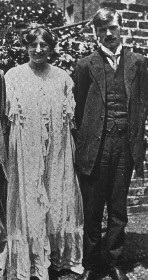D.H.Lawrence was one of the best english writers. He wrote novels, stories drama (at the end of the Sixties this was revived, in London, with some deservedsucces), travel books, criticism and poetry.D.H.LAWRENCE'S LIFE
His marriage to Frieda Lawrence, originally the German wife of an etymologist at Nottingham University, was probably about as stable as any marriage he miht have mad; but neither Frieda, nor any other woman, could have supplied his demands, which were unquestionably neurotic. In so far as Lawrence is a creative writer, he's liberating; but in so far as Lawrence was a sexual propeht, he was a dangerous man, insensitive to the effects of the tyranny of himself and others. His philosophy, that what is right is what feels right-in the "solar-plexus", the "blood" is certainly much more dangerous and ambiguous than Nietzsche's philosophy, which was the result of intellectual processes far more complex, and of a much deeper self-insight.
Lawrence acte on gis instincts and intuitions, but, at some relatively early stage, his sexual self-exploration became arreste: he became identified with the position in which he found himself. Even though he preached instinctive life, his own instinctive life was evidently more crippled than that of many men; the power of his message surely derives from the fierceness of his compensation for this in the Adlerian sense.
He seems to have sufferd from some kind of impotence and the descriptions of love-making in his novels are embarrassing and unconvincing, and are decked out with vulgar and pretentions language.
However, his descriptions of male contacts are often authoritative (the wrestling in Women in Love): there was a quality in women that sent him into a retreat whose ignominy, like his concomitant homosexual ignoral: his defensive sexual dogmatism destroyed his sexual freedom.
We can mention F.R. Leavis like an influential and gifted critic- whose own excellence is so similarly flawed. Leavis is a self-assertive moralist, and he has chosen to select what he likes from Lawrence's work and then to erect this as a kind of monument of twentieth-century genius- while "wilfully" (Daiches) ignoring Lawrence's limitations.
Now Lawrence's faults, which are bad once, go along with great virtues- the chief of them is the intuitive capacity to present hidden truths about human beings and their relationships in terms of their apprehensions of nature- but the faults need to be mentioned.
The best of the novels is Sons and Lovers (1913) for which he drew on the experiences of his own childhook- and in which he managed to be fair to his father.
Women in Love is ruined by his attempt o judge Gerald Crich instead of explaining him, and by the untruthful presentation of Birkin (himself) as a sexually self-fulfilled man. The book is about the relations between men and women's marriage.
But Lawrence's supreme achievement is in the best of his short stories, which were collecte in three volumen in 1955 (the short novels appeared in two volumes in 1957. Here, he didn't always feel impelled to intrude. Here his sense of humour (in Lawrence's writing this seldom manifests itself more specifically than as a sense of general relaxatio)emerges. In the Prussian Officer, one of his greatest stories, he is able to draw upon his homosexual proclivities without strain: writing it, he didn't have time to become upset and confused about this problem. It's in the stories that Lawrence reached perfection uninterrupted by the sort of neurotic turbulence that led him, in his final novels; to authoritarianism and (in Lady Chatterley's Lover, unexpurged version 1961) hysterical manipulation of a female character- he noble lady in the arms of the game keeper, a wishful portrait of Lawrence-under the disguise of writing a hymn to the life of the instincts.
Frieda and D.H.Lawrence

4595 Narrativa en Llengua Anglesa
©Copyright 98-99 Cristina Calatayud Micó
Created: 27/4/99 Updated: 28/4/99